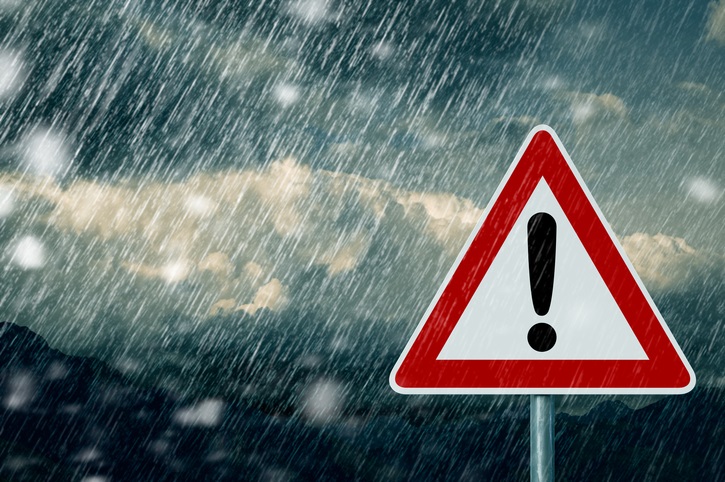Long after the storm passes and the rebuilding phase begins, there are lingering dangers major hurricanes can pose to a destination. According to On Call’s Chief Medical Officer, Dr. William Siegart, “The consequences of devastating storms like Maria, Irma, and Harvey catch our attention through headlines around casualties, flooding, and damages to property and infrastructure. However, there are also some serious health and environmental effects these storms can bring to destinations for months, years, and even decades to come. Being aware of these risks and taking appropriate precautions can help keep your travelers safe.”
An important aspect of duty of care is assessing risk and helping travelers plan accordingly. This Q+A with Dr. Siegart can help your organization understand more about the health risks that result from major hurricanes, and how to keep your people healthy and well informed when traveling to these destinations.

Aside from drowning and injuries from floodwater, what are some additional health risks a major hurricane poses to travelers and their organizations?
Dr. Siegart: Infectious disease outbreaks may occur days, weeks, or even months after a disaster occurs, regardless of the cause. In the last two decades, flooding has been the most common natural disaster, accounting for 43% of all recorded events. Floods place populations at high risk because of the shortage of potable water and the increased transmission of diseases that thrive in crowded, damp conditions. Water sanitation concerns are immediate and, depending on the level of disruption, they can remain a concern for days, months, and even years. Sanitary inspection for water quality is essential prior to consumption. Establishment of proper sanitation and sewage disposal, such as temporary latrines, offers the greatest protection against diarrheal illnesses until water and sewer infrastructure is restored. Diseases spread by vectors such as mosquitos do not go away quickly and may be a danger for years after a major hurricane due to proliferation in new or expanded breeding grounds caused by the flood waters. The potential for trauma exists from falling and floating debris, and structure collapse.
What kind of water-borne illnesses are prevalent after a major hurricane?
Dr. Siegart: Lack of clean water and disruption of sewage disposal promotes the spread of diarrheal illnesses including cholera, shigella, and E. coli. Additionally, displaced populations overcrowding shelters enhances transmission of respiratory illnesses such as measles, influenza, and pneumonia. Disruption of the local ecosystem can promote the spread of mosquito-borne diseases such as west nile, zika, malaria, and typhoid fever to name a few. Flies, lice, and rodents are also potential vectors of disease and quickly multiply in crowded conditions. Moreover, skin and soft tissue infections including tetanus and MRSA are more prevalent due to trauma (abrasions, lacerations) from the disaster or cleanup efforts and close interpersonal contact. Other severe skin infections such as from “flesh-eating bacteria” can occur from exposure to contaminated water. Without early detection or proper treatment, multiple diseases have the potential of causing death. This is particularly true in the very young or elderly, and anyone already compromised by severe or chronic illness.
What are some specific strategies travelers can employ if they find themselves in a situation where sufficient fresh water is not available?
Dr. Siegart: Access to sanitary water is an immediate concern—not just for drinking, but also for bathing, washing fruits and vegetables and even teeth brushing. In the event no fresh water is available, immediate evacuation, if possible, would be the first course of action. Use of water treatment measures such as UV light wand, chemical purification, or filtration devices is a temporary solution. However, the truth is, most people do not travel with this type of equipment. Boiling the water for three minutes is also an option, as it is an excellent disinfecting method.
How can a major hurricane affect travelers’ mental health, and what are some strategies for coping?
Dr. Siegart: It varies considerably from individual to individual. The most resilient will have little to no adverse mental health effects. On the other hand, there are those who suffer from mild to severe anxiety, depression, or PTSD after experiencing a disaster such as a major hurricane. Personality, age, temperament, available social support, cultural background, prior experience, gender, and pre-existing psychiatric illness are all examples of variables that can affect an individual’s response. Strategies for coping begin with the most basic, which involve the support of family, friends, and the restoration of safety. Anxiety may actually be the most severe prior to the hurricane, with relief after it passes. Sometimes professional help is necessary, and this may involve debriefing with other survivors, behavioral and cognitive therapy, group therapy, desensitization and relaxation therapy for tension, anxiety, and intrusive or disabling thoughts. These techniques can all help with coping skills, but sometimes medication coupled with long-term therapy is required.
How can a major hurricane affect a destination’s health care system and overall medical infrastructure?
Dr. Siegart: The health care system can sustain structural and nonstructural damages to hospitals, clinics, and healthcare centers. Local healthcare personnel are also subject to injury, illness, and even death. Disruption of emergency response services can also be a concern as well as the delivery of emergent care and subsequent definitive care. Healthcare systems often experience a dramatic surge of inpatients and trauma cases, which can quickly overwhelm hospitals’ capabilities. Additionally, damage and destruction to infrastructure outside hospitals, including roads, transportation services, power, water, and telecommunications, can compromise the health care system’s overall ability to deliver care.
How can On Call assist in a situation where medical resources are limited or even inaccessible due to a major hurricane?
Dr. Siegart: In these types of situations, On Call can support with on-the ground security issues that may arise from limited resources, coordination of post-storm evacuations, liaising with both foreign and domestic authorities, and advice related to continuity of operations. Our medical team can also work around the clock to assess damage to local facilities to determine their capabilities to treat an individual’s medical condition – and recommend alternate medical care options accordingly.
What are the top considerations and preventative strategies for those traveling to an area following major hurricane damage?
Dr. Siegart: It is generally not advised to travel to the site of a recent major hurricane until the relief and recovery phase has completed and there has been reasonable restoration of infrastructure, including medical care capacity.
Individuals should refrain from traveling to any disaster area until the local, state, or federal authorities have restored the infrastructure and deemed it safe. This helps to avoid contributing to overcrowding, competing for limited resources, and becoming an impediment to recovery and reconstruction efforts.
For more information on hurricane preparation and response, travel health and holistic risk management, contact us today.




